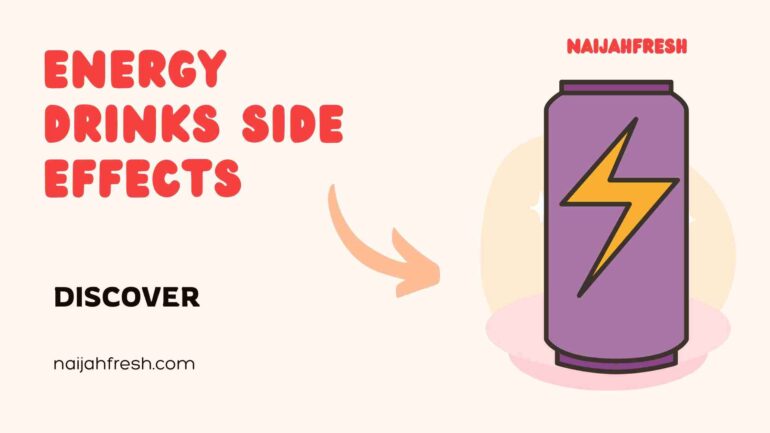Introduction
Ever wondered what’s really hiding behind that quick energy boost?
You’re not alone. Millions of people—especially young adults—reach for energy drinks every day to stay awake, alert, or simply power through their day. But here’s the catch…
The side effects may be doing more harm than good.
From sleepless nights to heart palpitations, the health risks are real—and they’re often overlooked.
In this article, we’ll break down the most common energy drinks side effects, both short-term and long-term. Whether you’re sipping them occasionally or chugging them daily, you deserve to know what you’re putting into your body.
Let’s dive in.
What Are Energy Drinks?
Let’s clear this up first…
Not all caffeinated drinks are created equal.
Energy drinks are beverages specially formulated to boost alertness, concentration, and physical performance. They typically contain high levels of caffeine, sugar, taurine, B vitamins, and herbal extracts like guarana or ginseng.
Sounds intense? That’s because it is.
Unlike your regular cup of coffee or tea, these drinks are engineered for maximum stimulation. Some cans pack as much as 500mg of caffeine—that’s equivalent to five cups of coffee in one go!
Here’s what makes them stand out:
- High caffeine content
- Added stimulants (like taurine and guarana)
- Sugars or artificial sweeteners
- Trendy packaging aimed at young, active consumers
But here’s where things get tricky…
Many people overlook the potential dangers lurking in those flashy cans. And that leads us to the real issue—energy drinks side effects.
Ready to unpack them?
Short-Term Side Effects of Energy Drinks
Let’s not sugar-coat it…
That energy boost comes at a cost.
While energy drinks might give you a quick surge in energy, the side effects can kick in just as fast — and they’re not always pleasant.
Here are some of the most common short-term side effects of energy drinks:
Increased Heart Rate and Blood Pressure
That pounding heart? It’s not just excitement. High doses of caffeine and stimulants can cause your heart to race and blood pressure to spike — especially dangerous for people with underlying heart conditions.
Anxiety and Jitters
Feel suddenly on edge or restless? You’re not alone. Excessive caffeine can overstimulate your nervous system, leading to anxiety, tremors, or nervousness.
Sleep Disturbances
Can’t sleep after that 4 PM energy drink? That’s because caffeine can stay in your system for up to 10 hours, disrupting sleep patterns and leading to insomnia or poor sleep quality.
Headaches and Dizziness
Dehydration and caffeine overload can lead to headaches, dizziness, or even migraines in sensitive individuals.
Digestive Issues
Many users experience nausea, upset stomach, or even diarrhea after consuming energy drinks — especially on an empty stomach.
But here’s the kicker…
These symptoms are just the beginning. The long-term side effects of energy drinks can be even more concerning.
Long-Term Side Effects of Energy Drinks
Do you think the occasional can is harmless?
Think again…
Regular consumption of energy drinks can slowly wreak havoc on your health — and the effects aren’t always easy to reverse.
Here’s what you need to watch out for:
Heart Health Risks
Studies have linked long-term energy drink use to an increased risk of irregular heart rhythms, high blood pressure, and even heart failure in extreme cases. The combination of caffeine, sugar, and other stimulants puts serious stress on your cardiovascular system over time.
Mental Health Issues
Feeling moody or low lately? Some research suggests frequent consumption may increase the risk of anxiety disorders, panic attacks, and even depression due to sleep disruption and nervous system overload.
Dental Problems
All that sugar and acidity? A recipe for enamel erosion and cavities. If you’re sipping on these drinks daily, your teeth may be paying the price.
Risk of Type 2 Diabetes
High sugar content in energy drinks can spike insulin levels and increase your chances of developing insulin resistance or Type 2 diabetes — especially with prolonged use.
Kidney Damage
Some ingredients in energy drinks (like excessive caffeine and taurine) may strain your kidneys when consumed in large amounts regularly. There have even been reports of kidney failure linked to energy drink overuse.
Weight Gain and Obesity
Many energy drinks are packed with empty calories. Drink them daily, and you could be stacking on the pounds without realising — especially if you’re not burning that energy off.
But it doesn’t stop there…
Let’s talk about who’s most at risk when it comes to energy drinks side effects — because some groups need to be especially careful.
Who Is Most at Risk from Energy Drinks Side Effects?
Not everyone reacts to energy drinks the same way.
While some people can handle the occasional can without trouble, others are far more vulnerable to their harmful effects.
Here’s who needs to be extra cautious:
Teenagers and Young Adults
Think teens are just being energetic?
Think again…
The developing brain and body are more sensitive to caffeine and stimulants. Excessive energy drink use in adolescents has been linked to sleep disturbances, increased anxiety, behavioural issues, and even risky behaviours like substance use.
Pregnant Women
High caffeine intake during pregnancy is a no-go. It can increase the risk of miscarriage, premature birth, and low birth weight. Most health guidelines recommend pregnant women avoid energy drinks entirely.
People with Heart Conditions
If you have any existing heart problems, energy drinks can be dangerous. They can trigger arrhythmias, spikes in blood pressure, and even cardiac arrest in rare cases.
People with Mental Health Disorders
If you’re dealing with anxiety, depression, or bipolar disorder, the stimulants in energy drinks can worsen symptoms — especially if consumed regularly.
Caffeine-Sensitive Individuals
Some people simply don’t tolerate caffeine well. If energy drinks make you jittery, dizzy, or nauseous, your body is telling you to steer clear.
Now you might be wondering…
Are there any safer ways to get a boost without the crash?
Let’s look at some healthier alternatives next. Shall we?
Healthier Alternatives to Energy Drinks
So, you want more energy — but without the crash, jitters, or long-term damage?
You’re not alone.
Millions are ditching energy drinks for safer, more sustainable ways to stay alert and focused.
Here’s what you can try instead:
1. Water + Lemon
Sometimes fatigue is just dehydration in disguise. A glass of water with a splash of lemon can wake you up better than any sugary can.
2. Green Tea
Green tea contains less caffeine than energy drinks but still provides a boost — along with antioxidants that support your health. No crash. No jitters.
3. Natural Smoothies
Blending fruits, veggies, and nuts gives you a steady source of energy from real food. Add a spoon of chia seeds or oats for lasting fuel.
4. B Vitamins
These vitamins help your body convert food into energy. If you’re often tired, a good-quality B-complex supplement might help (but check with a healthcare provider first).
5. Movement Breaks
A short walk or some stretches can instantly lift your energy levels. It boosts circulation, reduces tension, and clears mental fog.
6. Sleep (Seriously)
No drink can replace real rest. If you’re constantly reaching for energy drinks, it may be your body’s cry for better sleep, not more caffeine.
Your body craves energy, not stimulants.
Still curious how these drinks really stack up nutritionally?
Next up, we’ll break down what’s actually inside most energy drinks — and why it matters. Ready?
Energy Drink Ingredients?
You might be shocked at what’s hiding in your favourite can.
Sure, energy drinks promise alertness and stamina — but take a closer look at the label and you’ll find a cocktail of ingredients that can do more harm than good.
Here’s what you’re really consuming:
1. Caffeine — Lots of It
Caffeine is the main active stimulant. One of caffeine’s primary actions in the human body is its stimulating effect on cognitive functions. While small amounts can help with focus, energy drinks often contain high doses — sometimes more than a cup of coffee in a single can. This can lead to:
- Rapid heartbeat
- Anxiety
- Insomnia
- Dependency
Too much caffeine? Your nervous system pays the price.
2. Sugar — And Sometimes Way Too Much
Some energy drinks contain more sugar than soda. This gives you a short burst of energy… followed by a major crash. Over time, excess sugar can lead to:
- Weight gain
- Type 2 diabetes
- Tooth decay
- Fatigue
That quick boost? It comes with a crash — and a cost.
3. Artificial Additives
Think of dyes, preservatives, and artificial flavourings — none of which help your health. These ingredients can also trigger reactions in sensitive people.
4. Other Stimulants
Many energy drinks contain extras like taurine, guarana, or ginseng. While marketed as “natural,” these can amplify the effects of caffeine and cause:
- Heart palpitations
- High blood pressure
- Nervousness
5. B Vitamins (But in Excess)
Yes, B vitamins support energy metabolism — but in mega doses, they don’t do more and can even stress your liver.
Conclusion: Is That Can Really Worth It?
Let’s face it — the risks are real.
Energy drinks side effects range from jittery nerves and heart palpitations to long-term issues like high blood pressure, insomnia, and even addiction.
Sure, they might give you a quick boost…
But the crash, the stress on your heart, and the hidden health costs? They’re simply not worth it.
Here’s the bottom line:
If you’re reaching for energy, consider natural options like quality sleep, hydration, and balanced nutrition. Your body (and mind) will thank you in the long run.


